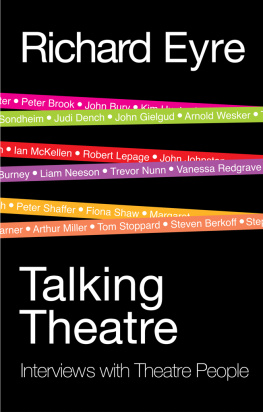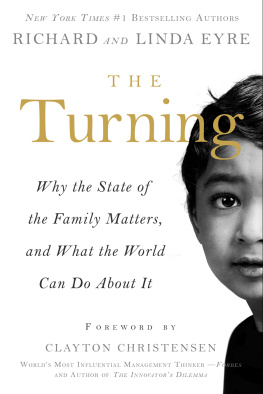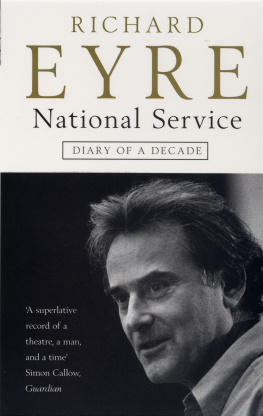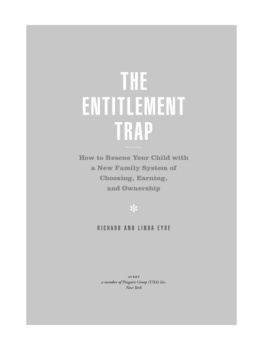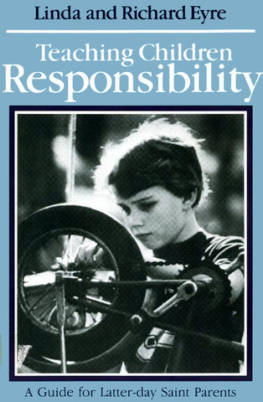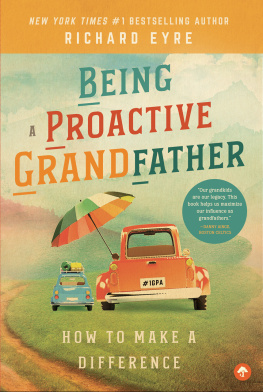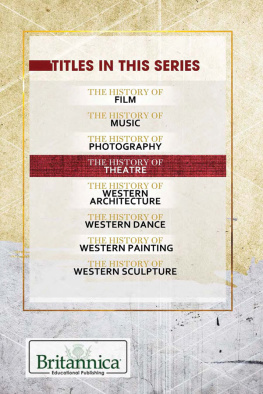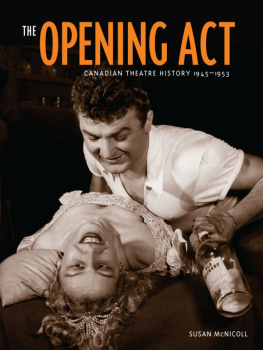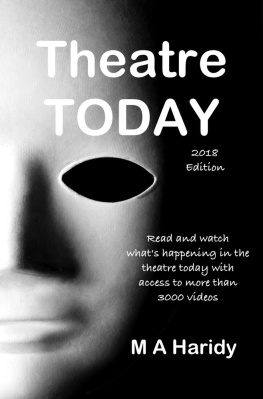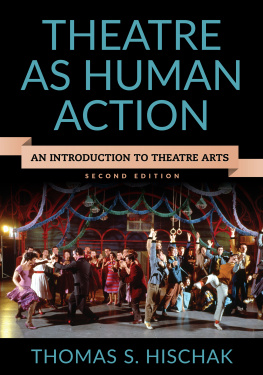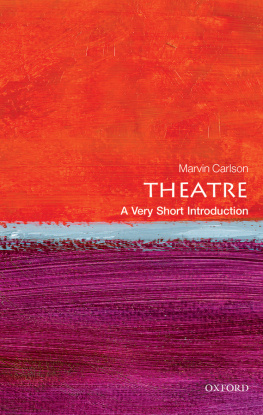Richard Eyre
TALKING THEATRE
Interviews with Theatre People

NICK HERN BOOKS
London
www.nickhernbooks.co.uk
For Suze and Lucy
If a person were to try stripping the disguises from actors while they play a scene upon stage, showing to the audience their real looks and the faces they were born with, would not such a one spoil the whole play? And would not the spectators think he deserved to be driven out of the theatre with brickbats, as a drunken disturber? Now what else is the whole life of mortals but a sort of comedy, in which the various actors, disguised by various costumes and masks, walk on and play each one his part, until the manager waves them off the stage? Moreover, this manager frequently bids the same actor to go back in a different costume, so that he who has but lately played the king in scarlet now acts the flunkey in patched clothes. Thus all things are presented by shadows.
Erasmus, The Praise of Folly
I personally would like to bring a tortoise onto the stage, turn it into a racehorse, then into a hat, a song, a dragoon and a fountain of water. One can dare anything in the theatre and it is the place where one dares the least.
Eugne Ionesco, Notes and Counter Notes
From the start it has been the theatres business to entertain people... it needs no other passport than fun.
Bertolt Brecht, A Short Organum for the Theatre
Introduction

I started going to the theatre when I was eighteen, in the early sixties. The start of my theatregoing coincided with a period of extraordinary theatrical energy and invention. I saw the work of Joan Littlewood at Stratford East, the Royal Court in its most fertile years, the newly formed Royal Shakespeare Company under Peter Hall in Stratford, and the newly formed National Theatre under Laurence Olivier at the Old Vic; Oh! What a Lovely War and The Wars of the Roses; Scofields Lear and Oliviers Othello; the young Maggie Smith, the young Albert Finney, the young Vanessa Redgrave, the young Judi Dench, the young Ian Holm, the young Ian McKellen, the even younger Michael Gambon; the older Richardson, Gielgud, Guinness, Ashcroft, even Edith Evans and Sybil Thorndike; the plays of Harold Pinter, John Osborne, Peter Shaffer, Arnold Wesker, Edward Bond, David Storey, Peter Nichols, Charles Wood and Tom Stoppardwith Kenneth Tynan presiding over it all as a mercurial judge and godfather.
What I liked about the theatre then and what I like about it now is its theatreness, the properties that make it distinct from any other mediumits use of time, of space, of light, of speech, of music, of movement, of storytelling. Theatre is intrinsically poetic, it thrives on metaphora room becomes a world and a group of characters becomes a whole society. It conscripts the imagination of the audience to transform the obvious unreality of costumed actors standing on a stage saying things theyve said to each other many times into something that is both real and truthful. Theatre insists on the present tensetheres a sense of occasion and of being part of a community in any theatre performance. We go into a theatre as individuals and we emerge as an audience. Above all, theatre can never dissolve its reliance on the scale of the human figure and the sound of the human voice.
In 1997, shortly before I left the directorship of the National Theatre, I was asked by Andrea Miller (the producer) and Mark Thompson (then Controller of BBC 2) to write and present a six-part television series for the BBC and PBS on the history of twentieth-century British theatre. The series was christened Changing Stages. I knew little of how these sorts of programmes are put together but enough to know that my contribution couldnt be improvisedI needed to do deep research and hard thinking before I could speak with any authority on the subject. In short, I had to write the book of the series before the series existed. I knew that I couldnt do this job alone so I asked Nicholas Wright, who had been an indispensable associate director at the National Theatre during my directorship, if he would join me in writing the book during the year before filming started.
Making television programmes about the theatre is a virtuous folly. Youll never be able to describe a memorable moment in the theatre accurately, because the essential element of contextreal time and real spacewill never be there in the description. Its like putting ventriloquism on the radio. But perhaps because I came from a generation which happily listened week after week to a radio programme called Educating Archie in which a ventriloquist did sketches with an invisible dummy, I leant towards believing that the effort was worthwhile.
Changing Stages was broadcast as part of the BBCs Millennium Project in 2000. The programmes were composed of archive footage, pieces to camera, documentary film and, most importantly, interviews with people who had played a significant part in making and influencing the theatre of the previous half-century in Britain, with occasional glimpses across the Irish Sea and the Atlantic beyond. If there were omissions it wasnt because there was a host of people who refused to be interviewed: almost all the people we asked agreed to talk to me on camera. The most notable refusal was from Marlon Brando, who sang down the phone from Los Angeles to the Glaswegian producer, Andrea Miller:
Just a wee deoch an doris, just a wee drop, thats all.
Just a wee deoch an doris afore ye gang awa.
Theres a wee wifie waitin in a wee but an ben.
If you can say, Its a braw bricht moonlicht nicht,
Then yer aricht, ye ken.
While he was enthusiastic to sing and discuss the work of Harry Lauder and the plight of the American Indian, he told her that he would rather do anything in the world than talk about acting.
The interviews in this book are a selection from the sixty or so that we recorded almost ten years ago. I cant claim that they give an encyclopaedic account of the British theatre at the end of the twentieth century, but they do give an authentic if partisan description of it. Reading these interviews is like looking through the wrong end of times telescope, but the contours of the theatrical landscape that appear are still present today. Sadly many of the people who shaped the landscape are not: John Gielgud, Arthur Miller, Jason Robards, August Wilson, Percy Harris, Jocelyn Herbert, Frith Banbury, John Bury, John McGrath and Harold Pinter. Its a doleful roll call of great talents, some of whom were also friends of mine.
The interviews were filmed on theatre stages and in auditoriums, dressing rooms, homes and hotels. The questions that I put to the interviewees were related to the topics of the six programmes:
Shakespeare: the DNA of our theatre. Changing styles of production and acting throughout the century.
Ireland: the dependence of the English theatre on Irish playwrights for nearly three centuries.
America: the Broadway musical and the plays of Eugene ONeill, Arthur Miller and Tennessee Williams. The American Dream and the American Nightmareaspiration and desperation.
1956: BeforeCoward, Rattigan, Ackland, Lawrence, the repertory movement and censorship by the Lord Chamberlain. AfterLook Back in Anger, the Royal Court and Joan Littlewood.
Brecht and Beckett: godfathers to a post-war generation. Their influence on the writers, directors and designers of the sixties and seventies.
Next page
